THE DEAD WEIGHT OF RANDOM TALK
Richard Greenberg’s better works’”Take Me Out, Three Days of Rain, The Violet Hour’”stand out by putting enough in play to make us care. Raven Theatre’s distressingly languorous Midwest premiere, Greenberg’s 2013 The Assembled Parties (the title a social and legal pun) spreads, circuitously and discursively, across two decades. Its putative purpose is to chronicle a fragmenting family. Delivering time capsules from holidays in 1980 and 2000, this 150-minute group portrait manages to seem both maddeningly improvisational and selectively targeted. Worse, it burdens us with conversations without consequences.
A whole greater than the sum of its acts, The Assembled Parties depicts two complicated Christmases and the extended Jewish family that oddly celebrates Noel. Each fete follows seemingly disastrous Presidential elections (Reagan in 1980; Bush Jr. in 2000) that test hopes and strain bonds. Likewise, Cody Estle’s dogged staging dares an audience not to think “So what?” after every scene.
A ton of gab transpires. Out of this small talk, family gossip, bitchy banter and occasional zingers congeals a sort of storyline. The married hosts are Ben Bascov (Joe Mack), a tough-talking minor mogul whose mother is strategically dying offstage, and former movie starlet Julie (Loretta Rezos), hoping that food connects loved ones when mutual respect cannot.
The guests are Ben’s comically cranky sister Faye (JoAnn Montemurro), her bitter-tongued, estranged husband Mort Rappaport (Chuck Spencer), their mousy, insecure daughter Shelley (Marika Mashburn), and family friend Jeff (Christopher Peltier), a Harvard classmate of their beloved son Scotty (Niko Kourtis). Like Scotty (who the doting parents believe is destined to be President), Jeff is trying not to become a lawyer. Both refuse to be groomed for glory; Jeff would rather teach (which some folks on opening night found strangely hilarious).
Greenberg’s hash of ethnic humor, sullen one-liners and desultory dialogue reveals the coping mechanisms of unpleasant and passive-aggressive relations, petty souls mired in entitled prosperity. (Their vast apartment, its elegant sprawl conveyed by set designer Jeffrey D. Kmiec, seemingly requires maps to the bedrooms.) Finally, after we learn of ailing Scotty’s breakup with an uncaring girlfriend and endure an awkward non-tryst between Jeff and Shelley, a not uninteresting subplot develops: Morty employs ugly blackmail threats against brother-in-law Ben in order to acquire a prized heirloom, a ruby necklace taken from the Old Country by a first-generation ancestor.
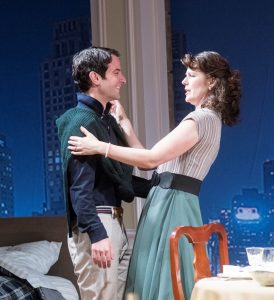 In the second act, retrospective and pointedly poignant, a generation has passed. Yet another disappointing President is headed to the White House. The Bascov-Rappaport clan, sharply reduced both in numbers and income, meet for another pseudo-Christmas celebration. Entropy, AIDS, and the law of diminishing returns have taken their toll: The second son, troubled (as in unemployable and “feckless”) Timmy (Kourtis), threatens ever-hopeful Julie’s maternal ardor (and our patience). Holed up with a Puerto Rican control freak, undutiful Shelley has abandoned wryly resigned Faye. Sustaining the family he visits on every occasion, Jeff, now a reluctant lawyer, struggles to help dropout Timmy as he did rebellious Scotty two decades before. Jeff’s devotion to Julie is far more filial than any love Scotty or Timmy never showed.
In the second act, retrospective and pointedly poignant, a generation has passed. Yet another disappointing President is headed to the White House. The Bascov-Rappaport clan, sharply reduced both in numbers and income, meet for another pseudo-Christmas celebration. Entropy, AIDS, and the law of diminishing returns have taken their toll: The second son, troubled (as in unemployable and “feckless”) Timmy (Kourtis), threatens ever-hopeful Julie’s maternal ardor (and our patience). Holed up with a Puerto Rican control freak, undutiful Shelley has abandoned wryly resigned Faye. Sustaining the family he visits on every occasion, Jeff, now a reluctant lawyer, struggles to help dropout Timmy as he did rebellious Scotty two decades before. Jeff’s devotion to Julie is far more filial than any love Scotty or Timmy never showed.
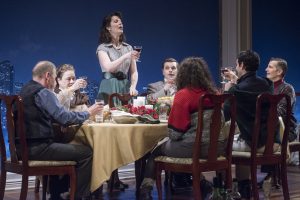
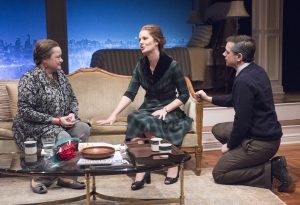 It’s here, in the play’s one satisfying plot twist, that the saga of the ruby necklace comes home to roost. In one of life’s larger ironies a presumably nasty case of betrayal and subterfuge eventually triggers a minor (Christmas) miracle to protect these survivors. It’s not redemptive enough to excuse the massive exposition that precedes it, but for once maudlin Julie’s penchant for saccharine serenity almost seems justified.
It’s here, in the play’s one satisfying plot twist, that the saga of the ruby necklace comes home to roost. In one of life’s larger ironies a presumably nasty case of betrayal and subterfuge eventually triggers a minor (Christmas) miracle to protect these survivors. It’s not redemptive enough to excuse the massive exposition that precedes it, but for once maudlin Julie’s penchant for saccharine serenity almost seems justified.
Tolstoy declared that unhappy families are all different in their miseries. But not all differences are equal in impact or worth. Estle sets a too-stately pace for this “tale of two sons,” an unedifying exposé that perversely emphasizes how little is at stake. The sardonically O’Henry-like payoff notwithstanding, The Assembled Parties is doggedly detailed given its generic characters and, at each act’s end, too sentimental for its unearned emotions. The Bascovs and Rappaports keep up appearances all too well.
The Assembled Parties
Raven Theatre, 6157 N. Clark St.
Thurs-Sat at 7:30; Sun at 3
ends on March 25, 2017
for tickets, call 773.338.2177
or visit Raven Theatre
for more shows, visit Theatre in Chicago
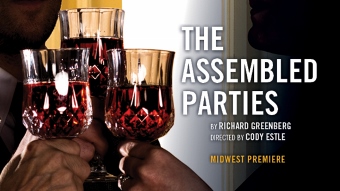
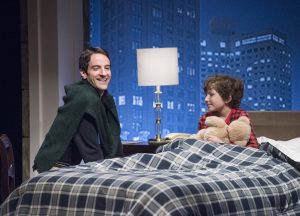
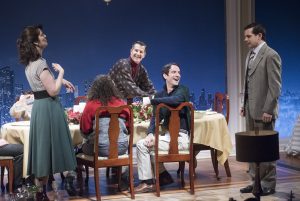
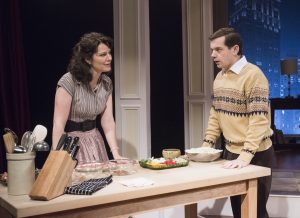
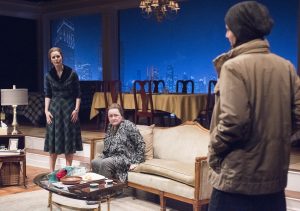
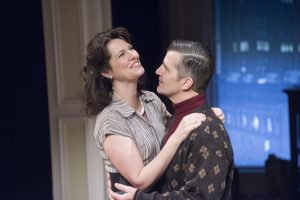
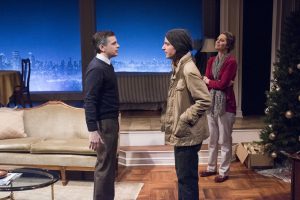

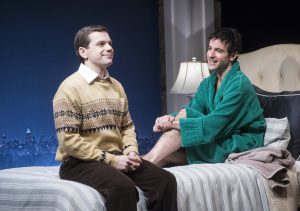
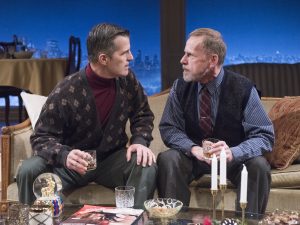
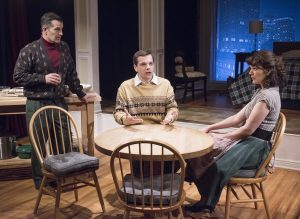
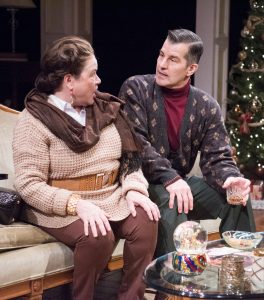

{ 1 comment… read it below or add one }
Couldn’t agree more. So little at stake throughout.